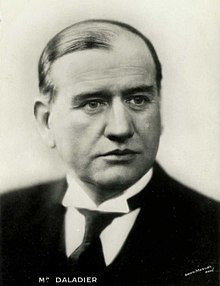Édouard Daladier
Jump to navigation
Jump to search

Édouard Daladier (French: [edwaʁ daladje]; 18 June 1884 – 10 October 1970) was a French Radical-Socialist (centre-left) politician and the Prime Minister of France at the outbreak of World War II.
Quotes[edit]
- If the blood of France and of Germany flows again, as it did twenty-five years ago, in a longer and even more murderous war, each of the two peoples will fight with confidence in its own victory, but the most certain victors will be the forces of destruction and barbarism.
- Quoted by William L. Shirer, The Rise and Fall of the Third Reich: A History of Nazi Germany. (Volume 2) p. 568
- Two hundred families are masters of the French economy and, in fact, of French politics. They constitute a force which a democratic state should not tolerate, which Richelieu would not have tolerated in the kingdom of France. The influence of the two hundred families weighs heavily on the fiscal system, on transportation, on credit. The two hundred families place their delegates in the seats of power. They operate on public opinion, for they control the press.
- Speech at the annual Congress of the Radical-Socialist Party in 1934. Quoted by William L. Shirer, The Collapse of the Third Republic (1969), p. 307.
Quotes about[edit]
- This pattern of Anglo-French mal-coordination, not helped by the divergence of domestic politics in the two countries when France briefly had a Popular Front government, was to continue until the outbreak of war. Even after the Anschluss, Chamberlain could not bring himself to utter more than the most ambiguous hint of support for France in the event of a continental war. Unfortunately, there was just as much ambiguity in the French position after Edouard Daladier became Prime Minister in April 1938, not least because of the habitual cowardice of Georges Bonnet, his Foreign Minister. In Asia, meanwhile, Britain simply could not choose between her interests in China and the need to avoid war with Japan. The British nightmare was a German-Italian-Japanese combination. Yet the more they sought to avert it by diplomatic expedients rather than military countermeasures, the more likely it became.
- Niall Ferguson, The War of the World: Twentieth-Century Conflict and the Descent of the West (2006), pp. 331-332
- Unlike the French government, Britain had no formal obligations to Czechoslovakia. A cardinal axiom of British foreign policy was not to get entangled in France’s alliance system in Eastern Europe, designed to threaten a resurgent Germany with war on two fronts. However, the French coalition government led by Édouard Daladier was itself bitterly split over Czechoslovakia, with one group willing to honor France’s obligations, another favoring peace at almost any price, and Daladier shifting uneasily between them. At root, a weakened and divided France would not go to war without Britain: for much of the Czech crisis, Paris therefore followed London—its “English governess,” in the words of one historian. And London, in essence, meant Neville Chamberlain, aged sixty-eight, who had succeeded Stanley Baldwin as prime minister in May 1937.
- David Reynolds, Summits: Six Meetings that Changed the Twentieth Century (2007), p. 42
External links[edit]
![]() Encyclopedic article on Édouard Daladier on Wikipedia
Encyclopedic article on Édouard Daladier on Wikipedia